The QLP Questionnaire: Michael Horvich
"I still grieve my husband Gregory's leaving nine years ago, but my belief is that great love means great grief and the grief never goes away, it just becomes easier to carry."
Email us at queerloveprojectsub@gmail.com to take “The QLP Questionnaire.”
Plus, find out how to submit your essay to The Queer Love Project.
We pay our contributors, so your subscription and support is valuable! Thanks for reading.
After a 30-year elementary school and university teaching career, I’ve been retired for 25+ years, but I have been more than active as an educator, public speaker, storyteller, writer, poet, photographer, blogger, artist, jeweler, book binder, lecturer, actor, supernumerary, museum curator, flea circus ringmaster, and dementia/Alzheimer’s advocate and caregiver partner for my life partner Gregory Maire (RIP.)
I’m also the creator of Michael’s Museum: A Curious Collection of Tiny Treasures, which has been a permanent exhibit since 2011 at Chicago Children’s Museum. I continue to collect and have transformed my condo into Michael’s Museum: Evanston Collections Campus (which is not open to the public).
With my husband Gregory, I established the More Than Ever Education Fund, which is administered to Chicago Area youth who are confronting homelessness by the premier not-for-profit La Casa Norte.
I’ve self-published 15 volumes of poetry, memoirs, self-help, and fiction. I walked the Dementia/Alzheimer’s path for 12 years with my husband Gregory with whom I was with for 41 years. I live with my cat, Gigi, in Evanston, Illinois.
You can find more of my writing here, and you can follow me at www.Horvich.com.
What is your age, where in the world do you primarily live, where did you grow up?
I just turned 80 in March (in fact, yesterday was my birthday). I live in Evanston, a city just outside of Chicago, and grew up in Chicago.
How do you define yourself on the LGBTQ+ spectrum?
I am 100% gay.
What is your relationship status?
I am a widow after 41 years of being with my husband. His last 12 years were spent dealing with dementia, most likely Alzheimer’s disease. He died nine years ago.
Do you have an “ideal” relationship status?
My “ideal” relationship was fulfilled by my love for Gregory, which lasted 41 years until his death in 2015. Currently, I am content to not have a relationship and have no plans to look for one.
What is the biggest misconception about being single or in a relationship?
I call this a “49-51% Controlling Interest” question. Being in a relationship takes a lot of work if one hopes it to be a healthy one. There is negotiation, compromise, sacrifice, losses, and gains, but it is well worthwhile and better than being alone through this life. Sometimes, the decision to pursue one or the other is a narrow one. Still, mostly, if you are willing to work at it, the love and support that comes out of being committed to another person far outweighs any benefits of living alone.
When was your first intimate moment? Was it with someone you liked? Did you feel pressured into it?
Of my own free will and accord, I can still feel the “tingle” of kissing, touching another man for the first time. In my day, being gay (a homosexual it was called in those early days) was a difficult place to be. There were no role models in the movies, musicals, on TV. When there were gay characters, they usually were unhappy and most likely committed suicide or were killed.
Often on being discovered gay, you were subjected to your family kicking you out of your home, places of employment firing you, being denied the ability to rent or own a house, being arrested if caught engaging in homosexual acts, being shunned by relatives and neighbors and friends, etc. My first experience was in college with a fellow student at the age of 19.
How would you define love? Is it the thing you work at for a long period of time? Or is it the strong feeling you feel for someone right from the beginning for no reason?
Love, I believe, begins as a sensual, sexual experience and then grows into bonding with another person. Love needs to be unqualified, accepting the other person for who they are, not thinking you can change them to become who you want them to be. Authorities in the field say that if the sexual relationship does not go deeper in the first year, it is doomed to failure.
Does the relationship fill your deepest needs for closeness with a person? Or do you prefer not to share every part of yourself?
If love is true and you are willing to work on making it a healthy relationship, you must be fully and completely open with a partner. How does one define healthy? I would choose these words as just a few of which are necessary: respect, communication, sacrifice, negotiation, compromise, compassion, generosity, and non-judgment.
When did you come out to family, friends and others for the first time?
The first time was when my mother read a love letter I had received from a partner while I was in college. I had left the letter in my chemistry book, which I took back home after the class semester. Into the next school semester, she let me know, without telling me why, that she hoped I would come home for a visit soon because she wanted to have a serious talk with me. I knew what that talk would be about.
In our talk, she did let me know she loved me no matter, but wanted me to visit a psychiatrist to help “cure” me. She wanted me to be happy as an adult and not have to face the life that homosexuals faced in love and relationships, this from her little knowledge of what the gay life was like. Our family doctor, ahead of his time I believe, advised her that if I was a happy, well-adjusted person doing well in college, she should just accept me for who I was and not feel the need to seek a “cure.”
Did you have any LGBTQ+ role models as a child or teenager? What do you remember about images of same-sex or queer relationships or messages you gleaned?
For the most part, there were none easily available and I had no LGBTQ+ role models in my personal life. As I mentioned above, in those days homosexuals were portrayed as sad, degenerate, not normal, sick people. Also, homosexuality as a positive experience was not portrayed in the literature. The “love that dare not speak its name” was never discussed by family except periodic references (not necessarily negative but not supportive either) about one family member or another who was an “odd duck”!
Are there any pivotal pop culture moments that you credit for teaching about love and/or relationships?
One book and author that stands out was James Baldwin, Giovanni’s Room.
Do you have a Chosen Family?
Yes. I call them “The Gay Family.” It included 10 men I met while working with Chicago’s Gay Horizons Community Center, now called The Center on Halsted, working on their hotline and facilitating support groups. The group traveled and vacationed, rented beach and ski cabins, celebrated holidays and birthdays together, organized what we called “culture buses” for Chicago adventures, and attended various events, including theater and musicals.
What is your relationship with your biological family (if any)?
By now, my biological family is no longer living. While they were, my relationship was a good one. I had two long-term lovers, and both were accepted by my immediate family. In the beginning, for my first 40 years, my extended family never discussed my homosexuality. At 40, in the 1980s, I decided that I would no longer be in the closet with anyone. One caveat, while my family accepted and loved me, they never really accepted or understood my being gay.
What do you (did you) like about dating as a LGBTQ person? What do/did you dislike?
In the beginning, as I have said, being gay was not easy or accepted. When I was too young for the bars, there was a diner in Chicago, called The Hollywood, in the gay neighborhood, where you could hang out in a booth with a Coke for hours on end and feel part of the “scene.”
Now and then I would sneak into a bar with fake ID. When of age, dating consisted mainly of going out to the bars: drinking, marijuana, poppers, and most wonderfully, dancing. At the various bars, one hung with the same group of people who you usually met at the bar and sometimes with crossover from one bar to another. I would not call them friends but rather acquaintances. Now and then you would meet someone new and go home after the bar for a “one-night stand.” Rarely did these “tricks” become “lovers” but, sometimes, they did become friends.
In those beginning days, the pall hung over your evening’s enjoyment of being in a bar with being caught in a raid by the police, carted off to jail, fingerprinted, held overnight, released with no charges, but having your name published in newspapers, having your family find out, being fired from your job when they found out. While this never happened to me, it did happen often in Chicago.
Has race, ethnicity or cultural differences been a factor in who you seek out?
All three have added to the allure, excitement, and “tricking” of those early days. In many cases, for me, being gay allowed for these racial, ethnic, and cultural exchanges to take place that otherwise would not take place in my normal, day-to-day white, middle class, suburban, Jewish life.
Have you had any difficulties dating or finding/keeping a relationship?
No. As I have said, relationships take a lot of work if they are going to last and be successful experiences. In my life, I have truly loved maybe half-a-dozen men and had long-term relationships with two men: one for 13 years and the second, my husband, of 41 years. (I might add that I did love two women during my college days, but those relationships were doomed because of the lack of sexual attraction.)
My 13-year relationship took place while I was young, and I didn’t know much about love and relationships but it was a fairly good one although filled with difficulty, lack of respect, lack of communication.
The best, however, began when I met Gregory, and I consider that my “match made in heaven.” In most ways, it was a perfect relationship and a perfect love! Gregory was a friend, lover, mentor, husband, confidant, soul mate, and more!
What’s the most surprising thing you have learned about relationships from your perspective?
In many ways—while the gay sexual activities are different—in my opinion, dating and loving someone of the same sex is pretty similar to straight relationships. One added benefit is that as a man, I know what a man is like and what he likes sexually, more than I understand the needs of a woman.
Have you experienced heartbreak?
Oh, definitely. Small heartbreaks early in my gay life when I thought I was very much in love, but it turned out to be just infatuation. Larger ones when breaking up with men having been in longer term relationships, and the biggest one when my husband, Gregory (RIP) of 41 years died. I still grieve his leaving nine years ago but my belief is that great love means great grief and the grief never goes away, it just becomes a easier to carry.
How would you term your sexual relationship with your primary partner? Has that changed over time?
Not sure what you mean by term. If you mean role in the relationship, in my early days of dating, people talked about who was the “top” or the “bottom.” Also “passive” vs “active.” Liking to be fucked anally, being the bottom, being passive was generally looked down upon and or not freely admitted. A “real man” preferred to “top,” “be active,” and to do the fucking. They also talked about “who was the husband and who was the wife,” who was the “male” and who was the “female” in the relationship.
When gay marriage became legal, in the beginning I had trouble referring to my partner as my husband because, in my day, if he was the “husband” that meant that I was the “wife,” and that was not true. In part, due books like, Susie Has Two Daddys or Jimmy Has Two Mommies, helped with the past stigma.
Now I am very comfortable with calling him my husband. In our relationship, Gregory and I changed roles often. For example, sometimes I was the “breadwinner,” supporting the family when he was in school, or looking for a new job, and vice versa. When asked, we would kiddingly (but truly) say: “Roles are subject to change on a moment’s notice!” As a couple, we divided roles by what one liked or was good at. Gregory cooked, I shopped for groceries. Gregory was the carpenter of the family, and I was the housekeeper. Etc.
Do you have any moments of joy, happiness or pleasure that you can share about being in a same-sex or queer relationship?
This is a hard one to answer. Over 41 years, Gregory and I had so many moments of joy, happiness, and pleasure that it is probably impossible to pick any one. As I have said, in many ways, a good relationship is a good relationship, whether same-sex, queer, or opposite-sex heterosexual. Relating to gay, just to name a few:
Gregory was president of Design Industries Fighting For AIDS. This was in the ’80s, and we attended the organization’s Gala. When the formal dinner was over and dancing on the dance floor in the center of the tables began, Gregory and I were the first to begin dancing. In many ways, it was a wonderful scandal because, even in those days, being demonstratively gay was not the norm. The sight of two men dancing at a formal event turned many a head, but it only took a short time before others—men/men, women/women, men/women—joined in.
It was gratifying to be accepted to Ragdale, an artist residency program in Lake Forest, Illinois, for Creative Nonfiction Writing; as an openly gay man writing about gay topics, Ragdale is a great place to be.
When Michael’s Museum: A Curious Collection of Tiny Treasures opened as a permanent exhibit at the Chicago Children’s Museum in 2011, introducing Gregory as my partner was so gratifying. We were accepted as a couple without any hesitation, and that was due to our obvious forthrightness and the museum’s accepting policy that “all people matter.”
Are there any things that standard heterosexual relationships have that you feel are out of reach or that you wish you had or could achieve?
There is only one, at this late stage of my life and with the continued growing acceptance of the LGBTQI Community, that I can think of and that is not having had children. In my early days, one could not foster or adopt children. In some ways, I am happy that I never took on that responsibility, but I wonder what it would have been like for Gregory and me to be fathers and to help raise children. I think we would have done a good job!
Have you ever been in a polyamorous relationship or would you like to be in a situation that doesn’t involve just two people?
For a brief while, Gregory and I were in a committed relationship while he was married to a woman, who knew he was bisexual. The three of us liked each other but never in a sexual way—although she tried to entice me. Eventually, he and Barbara divorced. I think that it takes enough work to make a successful relationship between two people and that it is very unusual for one with three people to work well. I have known a couple of people who have been in three-person relationships that worked well, but I cannot imagine it for myself.
Are you married? Have you ever wanted to be? Whatever the response, explain why and what your hopes, dreams and journey has been like.
Knowing from college that I was gay precluded my wanting to be married in the traditional sense. I did want a partner, a love and, nowadays, a husband. Gregory had just been diagnosed with dementia, most likely Alzheimer’s disease, when gay marriage became the law of the land. We chose not to legally marry at that point because it would have confused things financially in caring for him through the disease. We talked about this at great length but came to the conclusion that, while it was wonderful and amazing that we could marry, having that piece of paper would not make our union any more meaningful or important than it already was.
Any good/bad advice you received from a friend or queer elder?
In the early days of homosexuality, through the ups and downs of gay rights, with the sorrows of HIV/AIDS, and with the joys of more acceptance of being able to love who we chose to love, advice from other gay people was not to be had. By the time role models and more acceptance were more visible, we had become the elders giving the advice!
Any advice you’d give to someone younger than you who thinks it’s impossible to find love?
Wait for it to find you! If you work too hard trying to find it, you will be too busy to see it arrive and you will most likely miss out on catching it! First, work on loving yourself, and you will be better able to love someone else. When you do find your love, accept him for who he is, not for who you hope him to be or to become.
BONUS:
We all need more inspiration. Recommend something that influenced or helped shape you significantly that you’d recommend to someone else.
Book: Loving Someone Gay by Don Clark (he continues to update the book)
Movie: Harold and Maude
Song: “Time in a Bottle” by Jim Croce
Play, Musical, Other Cultural artifact: Bye Bye Birdie is the first musical I ever saw. Little Me is first musical I performed in. I’ve also been a supernumerary (acting extra) in 20 operas over 13 years for the Lyric Opera of Chicago.






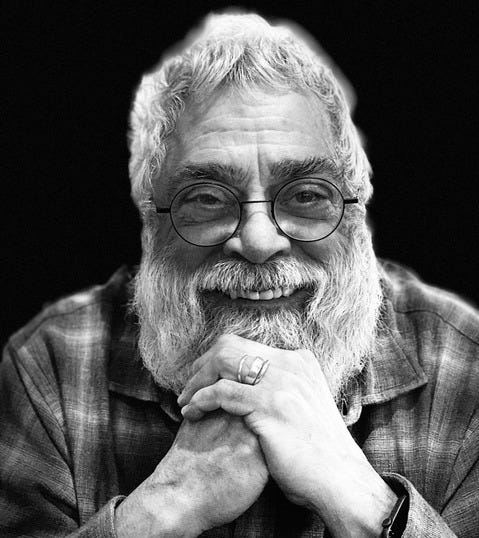
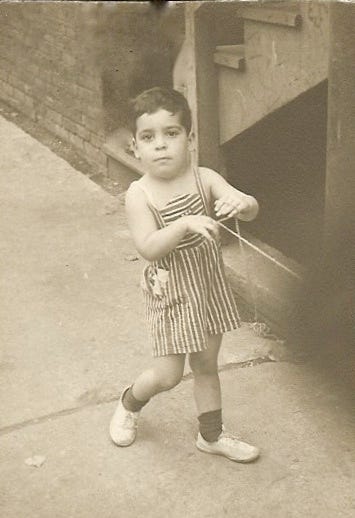
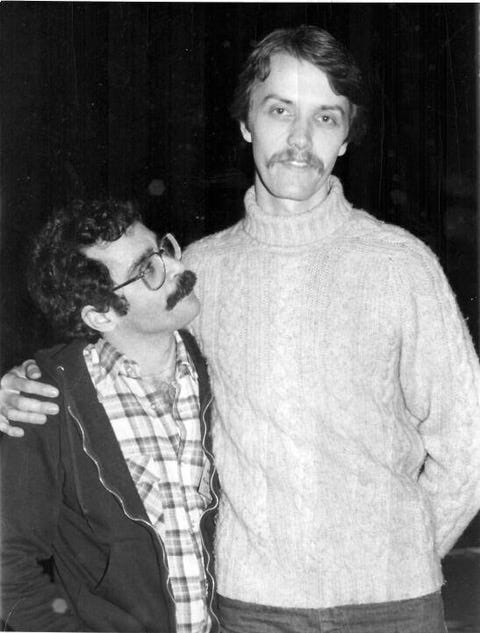
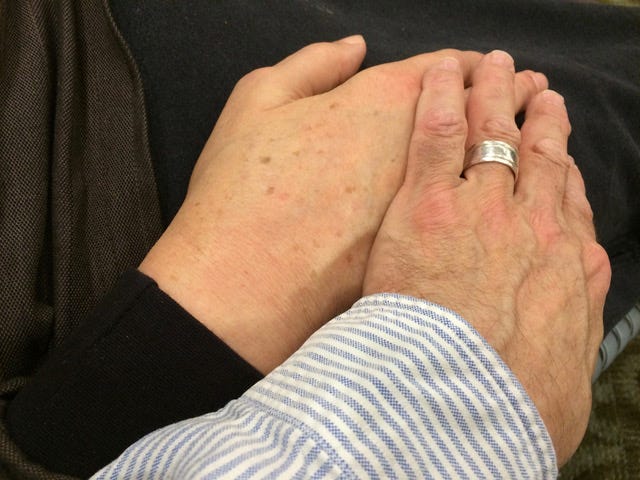
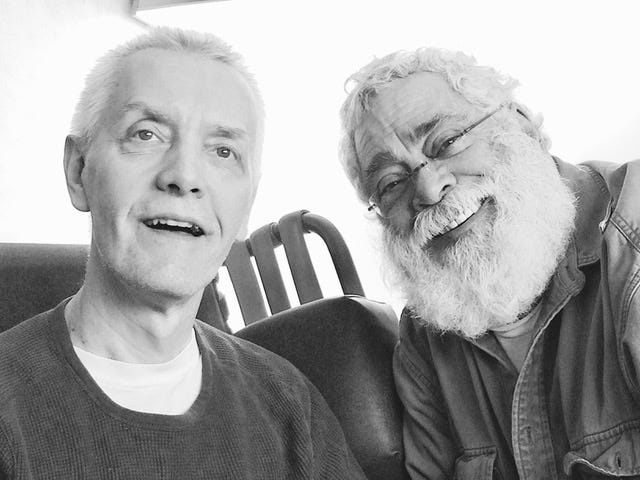

Queer love story, 41 years in the making. Despite his husband's death, Michael's continuing love in his memory shows happy endings are possible. Beautiful.
this made me cry but in the best way, so glad you found your person and that your love lives on ❤️ each day with our loved ones is a precious gift.